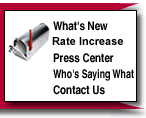


The Washington Times
Grover
Norquist
July 25, 2000
The nation is delirious with Harry Potter fever. Hundreds of thousands of kids are eagerly awaiting the mail delivery that will bring them their precious copy of the fourth installment of young Harry's adventures.
Little do these young readers suspect there's a far greater evil lurking without the book than within its pages. Because if the United States Postal Service has its way, these same kids will be hit with a 15 percent reader tax in time for Harry Potter V.
While most of Washington is basking in the aura of budget surplus and discussing tax cuts, the USPS has quietly proposed a 20 percent rate increase on books, 15 percent on magazines and 12 percent on rural newspapers delivered by mail. The $300 million magazine rate increase alone is threefold the inflation rate and double what is needed to cover costs. This periodical rate increase is nothing more than a reader tax only Harry Potter's arch-enemy Voldemort could love.
The pretzel logic of this proposal defies even the magic practiced at Hogwart's wizard school. At a time when our educational system is struggling to turn out a generation of literate students, books like the Harry Potter series have inspired millions of kids to read. Magazine publishers offer schools special editions of newsmagazines to help those eager readers learn about the world. Both political parties pledge themselves to improve the reading scores of our kids.
Postmaster General William Henderson proposes to do his part by taxing them.
Any other tax proposed in Washington today that would affect 166 million Americans - that's how many people go to their mailbox each year looking for one of the more than 6,000 magazines published in the U.S. - would die a quick death in a Congress that is busy slaying the dual dragons of the death tax and the marriage penalty.
Alas, Postal rate increases don't have to be approved by lawmakers. The Postal Service, a government-protected monopoly, must propose new rates to the Postal Rate Commission, an independent five-member panel, which engages in a 10-month decision process. Yet in the end USPS management can ignore the commission's decision, raise rates as it pleases, and face no market competition to prevent the levy of a reader tax.
Congress should insist that Henderson recant the evil spell that is his rate-increase request.
How nasty is this spell? In it, the USPS has simply ignored a two-year effort by magazine publishers, jointly with the Post Office, to find more efficient ways to handle periodical mail. The study that resulted identified more than $150 million in savings from better USPS organization, automation, facility location and transportation management. That is half the proposed $300 million increase - meaning the real need of USPS is for a rate increase of only 7.5 percent.
Mr. Henderson proposed this double-digit reader tax even though, at an October 1999 American Magazine Conference, he had pledged that any rate increase for magazines would be in the single digits.
One wonders how Mr. Henderson continues to defend this rate increase even though the Postal Rate Commission has demanded USPS management explain the runaway costs that have plagued this government-sponsored monopoly. (This is the same postmaster general who, at the Postal Forum in Nashville on March 20, declared that " w e have to bring our internal cost structure down and restrain prices" at the Post Office.)
This double-digit reader tax proposal stands some two months after Mr. Henderson told a House subcommittee that the study's cost savings amounted to more than $150 million and only a single-digit increase was needed to break even. Voldemort - sorry, Mr. Henderson - told the Senate just last week that "When we saw those cost studies we began working with the Magazine Publishers to try to identify strategies to reduce costs. And we think we've been successful with about $150 million identified."
Perhaps this $150 million is so hard to subtract from the rate increase because it has been affected by some sort of inadvertently cast invisibility spell. It happens.
Even Muggles (non-wizards, in Harry Potter land) don't need special powers to see that taxpayers are getting the short end of the broomstick. Congress should say a loud no on this horrible reader tax. Our lawmakers should tell Mr. Henderson and the Postal Service to implement the $150 million in savings identified in the joint survey and cut the proposed rate increases in half. Because what this country's readers need is a lot less Voldemort and a lot more Harry Potter.
Grover G. Norquist is president of Americans for Tax Reform.
WHAT'S NEW | RATE HIKE | PRESS CENTER | WHO'S SAYING WHAT | CONTACT US